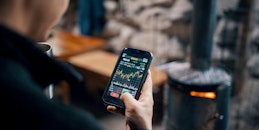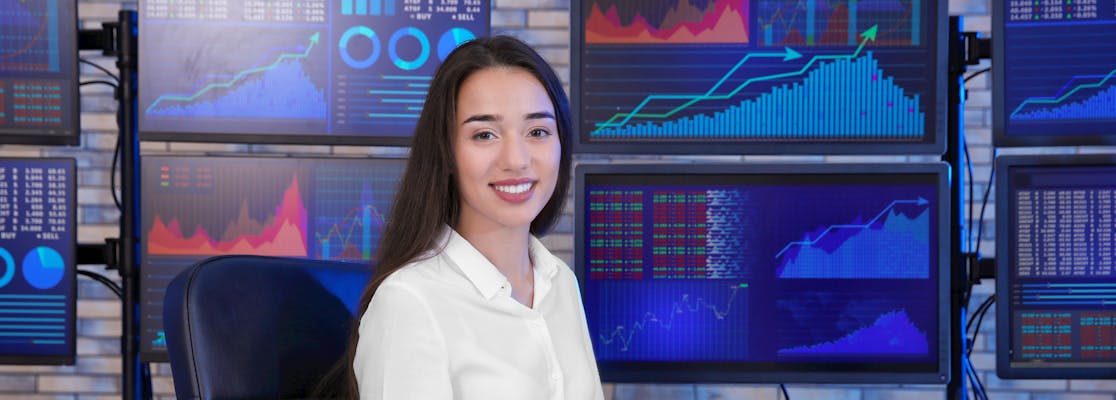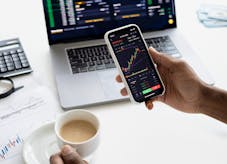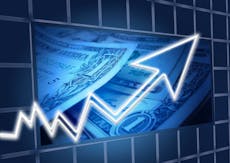CFD vs Options vs Futures – The Difference Between CFD and Options Explained For New Traders
All products and services featured are independently selected by WikiJob. When you register or purchase through links on this page, we may earn a commission.
CFDs (Contract for Differences), options and futures are different types of derivative financial instruments.
If you are a new or inexperienced trader, you must understand the key differences between them before you start trading.
In this article, you can find out more about these differences and use this information to decide which type of derivative financial instrument you want to trade.
What Is a Financial Derivative?
A financial derivative is a type of contract.
The value of the contract is derived from the price of an underlying asset, index or rate.
Investors use financial derivatives to speculate on price movements without owning the actual asset.
Common derivatives include CFDs, options and futures. CFDs and options offer the right (but not the obligation) to buy or sell at a pre-agreed price.
Futures are a formal agreement to buy or sell an asset on a date in the future at a predetermined price.
The value of a financial derivative is influenced by fluctuations in the value of the underlying asset. This means investors can capitalise on market movements and create diverse trading portfolios.
However, it is important to remember that financial derivatives also carry risks due to market volatility and the potential for significant financial exposure.
The Key Difference Between CFD Trading vs Options vs Futures
Here is an overview of the main differences between CFD, options and futures.
CFDs
CFDs are agreements made between a buyer and a seller. During a CFD trade, both parties agree that they will exchange the difference in the asset’s value between the contract’s opening and closing.
There is no obligation to buy or sell the underlying asset, but instead, settle the price difference in cash.
CFDs offer flexibility for both long and short positions on various financial instruments.
Options
Options give the holder the authority to buy (call option) or sell (put option) an underlying asset at a set price within a specified timeframe. However, there is no obligation to do so.
Option holders are not obliged to exercise the option, but they might choose to do so based on market conditions.
Option buyers pay a premium for this right, while sellers face unlimited risk.
Futures
Futures contracts are standardised agreements to buy or sell an asset at a set price on an agreed date in the future.
Both parties in a futures contract are obliged to fulfil the terms of the contract, i.e., to buy or sell the asset at the price that has been agreed upon.
Futures are traded on organised exchanges. This ensures transparency and a centralised marketplace.
What Is CFD Trading vs Options vs Futures?
A more in-depth understanding of each type of financial derivative is required to answer this question.
Read on for more detailed explanations of CFDs, options and futures.
What Are CFDs? What Is The Difference Between CFD and Options?
As mentioned above, CFDs are a type of financial derivative.
Traders can use them to speculate on price movements in different markets without having to own the underlying asset.
A CFD involves the buyer and seller agreeing to exchange the difference in an asset’s value from the contract’s opening to its closing.
CFD trading allows traders to go long or short, offering potential profits or losses according to market movements.
Leverage is often used, which helps to amplify both gains and risks.
CFDs enable traders to enjoy diverse trading opportunities but require careful risk management due to their inherent volatility. They are popular because of their accessibility and the ability to trade various asset classes.
Some traders prefer CFDs for their versatility. However, options may be better suited to traders who are looking for specific risk management strategies.
What Are Options?
Options trading involves buying and selling financial contracts called options.
Options are a type of derivative instrument. They give the holder the right to buy or sell an underlying asset, such as stocks, at a predetermined (strike) price within a specific period (expiration date). However, there is no obligation to do so.
There are two main types of options:
- Call options – Provide the right to buy the underlying asset at the strike price
- Put options – Provide the right to sell the underlying asset at the strike price
Options trading allows investors to speculate on price movements, hedge against potential losses, and create complex trading strategies according to market expectations.
Investors can choose whether they want to buy or sell options, and the value of options depends on factors including the underlying asset's price, volatility, time until expiration and interest rates.
As with any type of trading, options trading involves risk. If you want to trade options, you will need to have a good understanding of the market and relevant trading strategies.
What Are Futures?
Futures are standardised financial contracts. In futures trading, the buyer is obliged to purchase an asset or the seller to sell an asset, such as commodities, currencies or financial instruments, at a predetermined future date and price.
Futures contracts are traded on organised exchanges, so there is a centralised marketplace for buyers and sellers.
The key features of futures trading are:
Standardisation
Futures contracts have standardised terms, including the quantity and quality of the underlying asset, expiration date and contract size.
Obligation
Both the buyer and the seller must meet the terms of the contract at the point of its expiry, either by taking or making delivery of the underlying asset (or settling in cash)
Exchange-Traded
Futures are traded on organised exchanges. This ensures transparency, liquidity and a regulated trading environment.
Leverage
Futures contracts often involve leveraging. This means traders can control a larger position with less capital.
Risk Management
Futures can be used for hedging against price fluctuations. This helps businesses to manage the risks associated with changes in commodity prices.
As with all types of trading, futures trading carries a significant level of risk.

Getting Started with CFD vs Futures vs Options Trading
If you are interested in trading CFD, futures or options, here is an overview of the steps you will need to follow for each type of financial derivative.
Getting Started with CFD Trading
- Learn how CFDs work and understand the associated risks
- Decide which markets you are interested in trading in
- Choose a reputable, regulated and reliable CFD broker. You will need to think about things like trading fees, markets available and the type of trading platform
- Set up a trading account with your preferred broker
- Practice using a demo account. Demo accounts allow you to practice making trades using virtual money. This is an excellent way to become familiar with the platform and develop your trading strategy
- Set up a trading plan. This should include your overall goals and appetite for risk
- Implement risk management strategies, including setting up stop-loss orders
- Start trading. It is best to begin with small trades and gradually increase as you gain experience
Getting Started with Futures Trading
- Learn the basics about how futures contracts work, contract specifications and the markets you want to trade in
- Choose a reputable futures broker that offers the markets you want to trade in
- Open an account with your preferred broker
- Learn about risk management, including margin requirements, leverage and general risk management principles
- Practice. Some platforms offer simulated or paper trading. This means you can practice making trades without risking real money
- Set up a trading plan. Within this, you will need to define your overall strategy, including your goals and risk tolerance
- Stay up to date. Read market news, economic indicators and consider other factors that might influence the financial markets
Getting Started with Options Trading
- Understand the basics, including call and put options, strike prices, expiration dates and options premiums
- Choose a broker offering options trading
- Set up an account with your preferred broker
- Understand different options strategies, including covered calls, straddles, spreads
- Practice with a virtual account. Traders can use a virtual account to practice trading without risking any real funds.
- Create a trading plan. This should include your risk tolerance, goals and overall strategy
- Stay on top of market conditions, earnings reports, and news affecting the underlying assets
Remember that trading always involves risk. You should always start cautiously, take steps to educate yourself on an ongoing basis and consider seeking advice from financial professionals.
Frequently Asked Questions
It depends on your individual preferences.
The choice between CFD and futures trading depends on your trading style, risk appetite and what markets you want to gain access to.
You need to understand all of the associated risks and features before choosing.
It is best to seek advice from financial professionals and conduct thorough research before you decide.
CFDs, options and futures are derivative financial instruments with different structures.
CFDs are an agreement between a buyer and seller to exchange the difference in an asset’s value between the opening and closing date for the contract. There is no obligation to buy or sell the underlying asset - the price difference is settled in cash.
Options provide the right (but not obligation) to buy or sell an underlying asset at a pre-set price, offering flexibility without ownership.
Futures mandate an agreement to buy or sell the asset on a future date at a set price and involve contractual obligations, which are standardised on organised exchanges.
Choosing between CFD or options will depend on your preferences and appetite for risk. CFDs offer flexibility with leveraged trading on various assets, allowing both long and short positions.
Options provide the right (but not an obligation) to buy or sell an asset at a certain price, offering strategic choices.
Some people may prefer CFDs for their versatility, but options are better suited to those looking for specific risk management strategies.
Both offer unique features, so the best choice is different for each trader, depending on their trading goals, knowledge and risk tolerance.
CFD and options are both types of derivative financial instruments. However, they have different structures.
Some people believe that futures are better than CFDs. Futures contracts traded on organised exchanges provide standardised terms, which serve to reduce counterparty risk.
The centralised market structure also ensures transparency and regulatory oversight.
In addition, futures are subject to clear expiration dates, which means they offer a more structured approach to longer-term trading. However, the choice between futures and CFDs will depend on your trading preferences, risk tolerance and desired level of market access and flexibility.
CFD trading is banned in the US because it is against US securities law. Banning CFD trading for US residents helps stop the outflow of money to worldwide brokers.
Most CFD traders lose money due to leverage, lack of education, overtrading, poor risk management, market volatility and psychological factors such as fear and greed, which can impact trading decisions.
Many traders also have unrealistic expectations and a lack of discipline and use unreliable or poorly designed trading platforms, which leads to execution issues and technical problems.
If you want to make money from CFD trading, it is important that you invest time in education, develop a solid trading strategy, practice effective risk management, and use a realistic approach to trading.
You should also seek professional advice and make sure that you adapt your approach to suit market conditions.
It is theoretically possible to become a millionaire with CFD. However, you must recognise the significant risks that are involved.
CFDs offer leverage, which means traders can control larger positions with less capital.
Although this leverage can amplify profits, it also increases the potential for substantial losses.
Achieving consistent profitability in trading is challenging. If you want to succeed in CFD trading, you will need to have a solid understanding of the financial markets, a strong trading strategy, disciplined risk management and the ability to navigate volatile markets.
Final Thoughts
Choosing between CFDs, options, and futures will depend on your individual trading goals and preferences.
CFDs offer high leverage, which can amplify gains and losses, making them riskier for some traders.
Options provide the right (but not an obligation) to buy or sell an asset at a set price, offering strategic choices. Some people may prefer CFDs for their versatility, but options are better suited to those looking for specific risk management strategies.
Futures are an agreement to buy or sell an asset on a specified date at an agreed price. Both CFD and futures trading allow for leverage trading, but you may have access to more strategic choices with CFDs.
The regulations governing CFD, options and futures trading vary between countries, which affects their accessibility and the protection available to traders.
Some assets might be more accessible using one type of trading over another.
Ultimately, you must consider your trading style, appetite for risk and the markets you want to trade in before deciding. It is also crucial to understand all of the associated risks and features before choosing.
WikiJob does not provide tax, investment or financial services and advice. The information is being presented without consideration of the investment objectives, risk tolerance or financial circumstances of any specific investor and might not be suitable for all investors. Past performance is not indicative of future results. Investing involves risk including the possible loss of principal.






